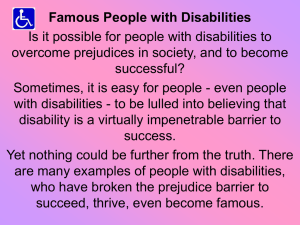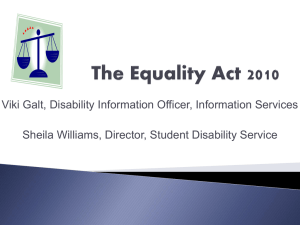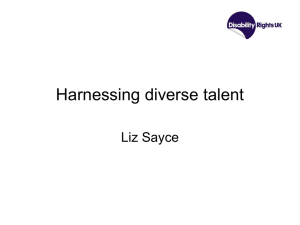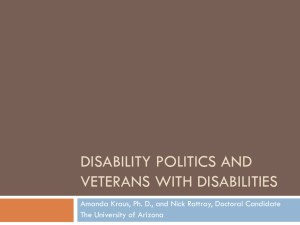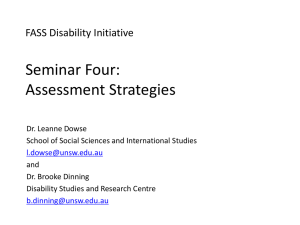Melanie Tether - Equality and Human Rights Commission
advertisement
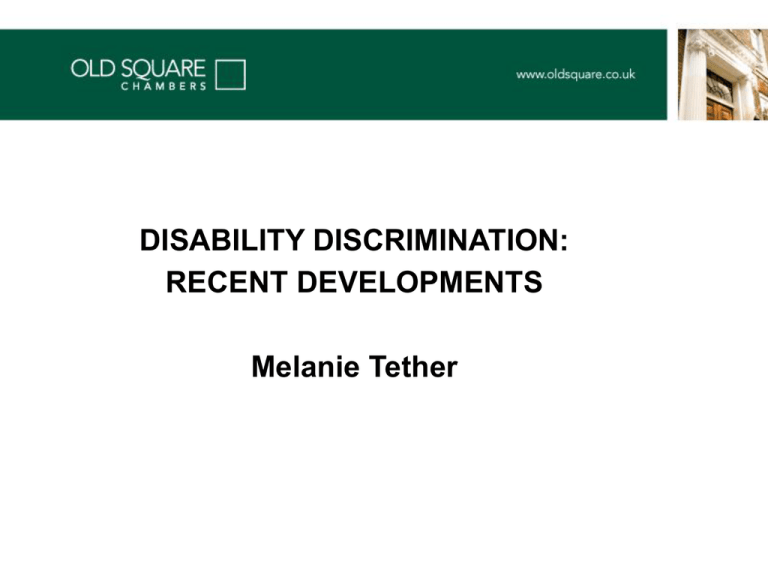
DISABILITY DISCRIMINATION: RECENT DEVELOPMENTS Melanie Tether Recent developments Meaning of disability Proving disability Justifying discrimination arising from disability Employer’s knowledge of disability The duty to make reasonable adjustments Meaning of disability Framework Directive does not define concept of disability Article 1 of the UN Convention on the rights of persons with disabilities provides: Persons with disabilities include those who have long-term physical, mental, intellectual or sensory impairments which in interaction with various barriers may hinder their full and effective participation in society on an equal basis with others HK Danmark UN Convention is now part of EU law Framework Directive must be interpreted so as to be consistent with the Convention Concept of disability refers to a limitation which results from physical, mental or psychological impairments which in interaction with various barriers may hinder the full and effective participation of the person concerned in professional life on an equal basis with other workers Is obsesity a disability? In Kaltoft the Danish Court asked: Does the general principle of nondiscrimination recognised by Art 6 TEU prohibit discrimination on grounds of obesity? Is obesity a disability within the meaning of the Framework Directive? Kaltoft EU law does not lay down a general principle of non-discrimination on grounds of obesity Obesity is not in itself a disability It may constitute a disability if it entails a longterm limitation that hinders full and effective participation in professional life on an equal basis with other workers The extent of a disabled person’s contribution to the onset of their disability is not relevant Is inability to bear a child a disability? In Z v A Government Department the claimant arranged to have a child through surrogacy arrangements She argued that her employer’s refusal of paid leave equivalent to maternity/adoption leave was disability discrimination Irish Equality Tribunal made a reference to CJEU Z v A Government Department Being unable to bear a child is not a disability within the meaning of the Framework Directive because it does not constitute a hindrance to the exercise of professional activity The Framework Directive is not incompatible in this respect with the UN Convention Meaning of normal day-to-day activities Under s. 6 EqA, an impairment only constitutes a disability if it has a substantial and long-term adverse effect on the ability to carry out normal day-to-day activities In order to give effect to EU law, the phrase “day-to-day activities” should be given a meaning which encompasses activities relevant to participation in professional life – see Sobhi v Commissioner of Police of Metropolis Proving disability What evidence is necessary in order to decide whether a person is disabled? Who should pay for expert medical evidence? City Facilities Management v Ling ET adjourned PHR because impact statement and GP records not sufficient to assess disability Employer ordered to pay for joint expert report EAT held that: expert medical evidence not always necessary burden of proof is on claimant and it is wrong for ET to proactively seek further medical evidence no basis for ordering respondent to pay full cost of joint expert report Hutchison 3G v Edwards ET found that E’s condition was a severe disfigurement It relied on E’s impact statement and a medical report from his GP EAT held that ET not required to carry out a visual inspection of E or look at photographic evidence Discrimination arising from disability Under s. 15(1) EqA, unfavourable treatment because of something arising in consequence of a worker’s disability is unlawful unless employer can show that the treatment is a proportionate means of achieving a legitimate aim The principle of proportionality requires the ET to weigh the real needs of the undertaking against the discriminatory effects of the treatment Burdett v Aviva B was a paranoid schizophrenic who sexually assaulted two colleagues after he stopped taking his anti-depressant medication ET found that the dismissal was because of something arising in consequence of B’s disability However, it held that dismissal was justified by a legitimate aim, namely “adhering to appropriate standards of conduct in the workplace” Burdett v Aviva: EAT The ET had failed to engage with A’s stated legitimate aim, which was to ensure the future safety of its employees (an aim that was protective rather than retributive) The ET had failed to weigh in the balance the discriminatory impact of the dismissal (which had a devastating effect on B) against other alternatives open to A, including the option of B working from home Employer’s knowledge Employer not liable for discrimination arising from disability or a breach of the duty to make adjustments if it does not know, and could not reasonably be expected to know, that the employee is disabled Does an employer have the requisite knowledge if its OH advisers express the view that the employee is not disabled? Gallop v Newport City Council G absent from work for long periods because of depression found by ET to be a disability Medical certificates from G’s GP stated that his absences were due to depression and anxiety OH reports acknowledged that G was suffering from symptoms of depression and anxiety but expressed the view that he was not a disabled person, without giving any reasons for that view Gallop v Newport City Council: CA Employer has requisite knowledge if it has actual or constructive knowledge of the facts constituting the disability Not necessary for employer to know that, as a matter of law, the employee is a disabled person Newport could not rely on their unquestioning adoption of OH’s unreasoned opinions An employer seeking outside advice must ask specific practical questions Duty to make reasonable adjustments Arises where a provision, criterion or practice (PCP) or physical feature of premises puts a disabled person at a substantial disadvantage in comparison with persons who are not disabled Gives effect to Article 5 of the Framework Directive (Reasonable accommodation for disabled persons) Associative discrimination The principle of equal treatment not only prohibits direct discrimination in respect of an employee who is herself disabled but also makes it unlawful to discriminate against an employee because she is associated with a disabled person – see Coleman v Attridge Law Does the concept of associative discrimination apply to the duty to make adjustments? Hainsworth v MoD H was civilian employee working in Germany Requested a transfer to UK so that her disabled daughter could attend a school for children with special needs H contended that MoD’s duty to make reasonable adjustments included a duty to make adjustments to accommodate her disabled daughter Hainsworth v MoD: CA Framework Directive did not require MoD to make adjustments for benefit of H’s disabled daughter Clear focus of Art 5 is on provisions to be made by employer for its disabled employees Wording of Art 5 gives no clue as to proximity that would be required for another disabled person to be “associated” with the employee No need for reference to CJEU Absence management polices Does the duty to make reasonable adjustments for a disabled person require an employer to make adjustments to an absence management policy? This question will be considered by Court of Appeal in Griffiths v Secretary of State for Work and Pensions in February 2015 Griffiths v SoSWP G is disabled due to post-viral fatigue and fibromyalgia SoSWP operates Attendance Management Policy (AMP) with “consideration points” for formal action, eventually leading to dismissal G contended that SoSWP should rescind written warning and increase her consideration point for the future from 8 to 20 days in any rolling 12 month period to accommodate her disability Griffiths v SoSWP: duty point EAT held that duty to make reasonable adjustments not triggered because AMP did not put G at a substantial disadvantage in comparison with persons who were not disabled Proper comparator was a non-disabled person absent for sickness reasons for same amount of time as G but not for disability-related sickness C had been treated at least as well as such a comparator Griffiths v SoSWP: adjustments point The adjustments sought by G were not within the scope of the statute, as they would not assist G to carry out her work but simply facilitate her absence from work ET was not wrong to hold that G was seeking an unlimited uplift to her consideration point and had been entitled to find that the adjustments she sought were not reasonable General Dynamics v Carranza C had lengthy periods of absence which were related to his disability and had previously received a final written warning After a period of absence unrelated to his disability, C was dismissed C complained that respondent breached duty to make adjustments by failing to disregard his disability-related absences and his final written warning when deciding whether to dismiss him General Dynamics v Carranza: EAT Cases involving dismissal for poor attendance can be difficult to analyse in terms of duty to make adjustments and may be best considered under s. 15 (discrimination arising from disability) The mental process of disregarding a warning was not a “step” within the meaning of s. 20 EqA Employer not required to disregard all C’s disability related absences, whatever the impact of doing so Firstgroup plc v Paulley Was F’s policy of requesting but not compelling non-wheelchair users to vacate the wheelchair space on a bus if a wheelchair user wanted to use it a breach of the duty to make reasonable adjustments? Judge held that the PCP was “the policy of first come first served whereby a non-wheelchair user would be requested to move but if the request was refused nothing more would be done” Firstgroup plc v Paulley: CA The PCP must reflect the base position before adjustments are made for disabled persons It includes any practice or policy which applies to everyone, but excludes any adjustments Where an adjustment is made to a PCP to accommodate a disabled person, the real question to be decided is whether that adjustment goes far enough Firstgroup plc v Paulley: the PCP PCP was F’s policy of first come first served Policy of requesting but not requiring nonwheelchair users to move was not part of PCP but an adjustment intended to comply with F’s statutory duty to make reasonable adjustments It could not therefore be taken into account in deciding whether policy of first come first served put wheelchair users at substantial disadvantage in comparison with non-wheelchair users Contact London 10 - 11 Bedford Row London WC1R 4BU DX 1046 London / Chancery Lane T +44 (0) 20 7269 0300 F +44 (0) 20 7405 1387 Bristol 3 Orchard Court, St Augustines Yard Bristol BS1 5DP DX 78229 Bristol 1 T +44 (0) 117 930 5100 F +44 (0) 117 927 3478 E clerks@oldsquare.co.uk W www.oldsquare.co.uk
